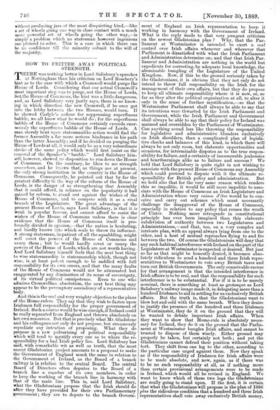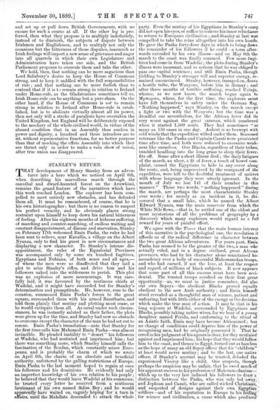HOW TO FRITTER AWAY POLITICAL STRENGTH. T HERE was nothing better
in Lord Salisbury's speeches at Nottingham than his criticism on Lord Rosebery's hint as to the ease with which a Cromwell would purge the House of Lords. Considering that our actual Cromwell's most important step was to purge, not the House of Lords, 14 the House of Commons, the hint was a little dangerous, and, as Lord Salisbury very justly says, there is no know- ing in which direction the new Cromwell, if he once got into the lobby between the two Houses, would turn. If he showed Carlyle's ardour for suppressing superfluous babble, we all know what he would do ; for the superfluous babble of the House of Commons certainly exceeds enor- mously the superfluous babble of the House of Lords. A man sternly bent upon statesmanlike action would find the former Assembly a far more serious hindrance in his path than the latter Assembly; and if he decided on purging the House of Lords at all, it would only be as a very subordinate stroke of the same policy which would first insist on the removal of the Speaker's "bauble." Lord Salisbury him- self, however, showed no disposition to run down the House of Commons. On the contrary, he likes to see strength somewhere, and he knows that, as things are at present, the only strong institution in the country is the House of Commons. Consequently, he pointed out that by far the greatest difficulty in the way of the reform of the House of Lords, is the danger of so strengthening that Assembly that it could afford, in reliance on the popularity it had gained by reform, to stand out against the wishes of the House of Commons, and to compete with it as a rival branch of the Legislature. The great advantage of the • present House of Lords, says Lord Salisbury, is that it is weak in popular favour, and cannot afford to resist the wishes of the House of Commons unless there is clear evidence that the House of Commons itself is pro- foundly divided in opinion,—that the nation is hesitating, and hardly knows into which scale to throw its influence. A strong statesman, impatient of all the squabbling, might well covet the powers of the House of Commons and usurp them ; but he would hardly covet or usurp the powers of the House of Lords, which are not worth having. And Lord Salisbury himself feels that the next best thing to wise statesmanship is statesmanship which, though not wise, is at least potent enough to be saddled with full responsibility for its own errors, and that the many faults of the House of Commons would riot be attenuated but exaggerated by any diminution of its sense of sovereignty, of its virtual political omnipotence. Even to one who admires Cromwellian absolutism, the next best thing may appear to be the peremptory ascendency of a representative body.
And this is the real and very weighty objection to the plans of the Home-rulers. They say that they wish to fasten upon Irishmen full responsibility for the proper government of Ireland. Such a course would be wise enough, if Ireland could be really separated from England and thrown absolutely on her own resources. But that is precisely what Mr. Gladstone and his colleagues not only do not propose, but strenuously repudiate any intention of proposing. What they do propose is a new pulverising of political responsibility which will tend to mystify every one as to where the re- sponsibility for a bad Irish policy lies. Lord Salisbury has said, with remarkable wit as well as truth, that the most recent Gladstonian project amounts to a proposal to make the Government of England much the same in relation to the Government of Ireland, as the Board of a branch railway is in relation to the central Board. The central Board of Directors often deputes to the Board of a branch line a number of its own members, in order to keep the working of the branch line in harmony with that of the main line. This is, said Lord Salisbury, what the Gladstonians propose that the Irish should do after they have provided for their own Parliamentary government ; they are to depute to the branch Govern- ment of England an Irish representation to keep it working in harmony with the Government of Ireland. What is the reply made to that very pungent criticism on the newest Gladstonian plan ? Why, that the Par- liament at Westminster is intended to exert a real control over Irish affairs whenever and wherever that Parliament is dissatisfied with what the Irish Parliament and Administration determine on; and. that that Irish Par- liament and Administration are nothing in the world but expedients for correcting, by adequate local knowledge, the abominable bungling of the Legislature of the -United Kingdom. Now, if this be the ground seriously taken by the Gladstonians, it is obvious that they not only do not intend to throw full responsibility on the Irish for the management of their own affairs, but that they do propose to keep all ultimate responsibility where it is now, or, so far as they alter the political organisation at all, to alter it only in the sense of further mystification,—so that the Westminster Parliament shall always be able to say that its intentions were thwarted by the Irish Parliament and Government, while the Irish Parliament and Government shall always be able to say that their policy for Ireland was maimed and overridden by the Parliament of Westminster. Can anything sound less like throwing the responsibility for legislative and administrative blunders exclusively on Irish shoulders, than a complicated plan of legisla- tive checks and balances of this kind, in which there will always be not only room, but elaborate opportunities and occasions, for interminable disputes as to the true respon- sibility for failure, and a certainty of innumerable jealousies and heartburnings alike as to failure and success ? We hold that Lord Salisbury is quite right in not wishing to associate with the present House of Commons any Assembly which could pretend to dispute with it the ultimate re- sponsibility for British policy and administration. But we hold also that for the very same reason which renders this so impolitic, it would be still more impolitic to asso- ciate with the House of Commons an Irish Legislature and Administration whose very raison d'être would be to con- ceive and carry out schemes which must necessarily challenge the disapproval of the House of Commons, especially in relation to any policy that rouses the wrath of 'Ulster. Nothing more retrograde in constitutional principle has ever been imagined than this elaborate subdivision of authority between two Legislatures and Administrations,—and that, too, on a very complex and intricate plan, with an appeal always lying from one to the other, and a host of mutual reproaches flying to and fro between the two. Of course the Gladstonians will deny that any such habitual interference with Ireland on thepart of the Legislature at Westminster is expected or desired. But just so far as that might be honestly denied, it becomes abso- lutely ridiculous to send a hundred and three Irish repre- sentatives to Westminster to vote away British taxes and turn out British Governments. The only conceivable excuse for that arrangement is that the intended, interference in Irish affairs is to be real, and that the responsibility for such interference is to be substantial. For if it is to be merely nominal, there is something at least as grotesque as Lord Salisbury's railway image made it, in delegating more than a hundred Irishmen to aid in settling for us exclusively British affairs. But the truth is, that the Gladstonians want to blow hot and cold with the same breath. When they desire to justify the presence of the hundred and three Irishmen at Westminster, they do it on the ground that they will be wanted to debate important Irish affairs. When they want to show that Home-rule is absolutely neces- sary for Ireland, they do it on the ground that the Parlia- ment at Westminster bungles Irish affairs, and cannot be trusted to dispose of them wisely. Either ground may properly be taken, but certainly not both ; and yet the Gladstonians cannot defend their position without taking both. They shift from one leg to the other, according to the particular case urged against them. Now they speak as if the responsibility of Irishmen for Irish affairs were to be made absolute, and now, again, as if there was to be no such responsibility at all, as if nothing more than certain provisional arrangements were to be made in Ireland, which would all be revised in England. We want to know which of these two legs the Gladstonians are really going to stand upon. If the first, it is certain that what the Gladstonians will propose is the plan of 1886 plus the ridiculous condition that a hundred and three Irish representatives shall vote away exclusively British money, and set up or pull down British Governments, with no excuse for such a course at all. If the other leg is pre- ferred, then what they propose is to multiply indefinitely, instead of to diminish, the subjects of dispute between Irishmen and Englishmen, and to multiply not only the occasions but the bitterness of those disputes, inasmuch as Irish feelings will import a new sense of grievance and anger into all quarrels in which their own Legislature and Administration have taken one side, and the British Parliament proposes to overrule them and take the other.
We hold, then, that nothing can be more sagacious than Lord Salisbury's desire to keep the House of Commons strong, and to keep it saddled with the full responsibilities of rule ; and that nothing can be more foolish than to contend that if it is to remain strong in relation to Ireland under Home-rule, as the Gladstonians sometimes tell us, Irish Home-rule can be anything but a pure sham. On the other hand, if the House of Commons is not to remain strong in relation to Ireland after Home-rule is estab- lished, but is to abdicate virtually almost all its power, then not only will a stroke of paralysis have overtaken the United Kingdom, but England will be deliberately exposed to the mockery of the whole civilised world, in virtue of the absurd condition that in an Assembly thus sunken in power and dignity, a hundred and three intruders are to sit, without representative functions, for no better purpose than that of mocking the effete Assembly into which they are thrust only in order to make a vain show of union, after true union nas disappeared.







































 Previous page
Previous page